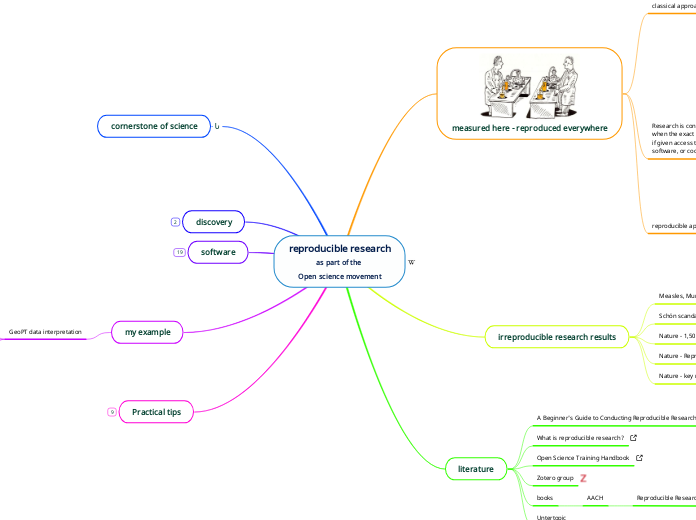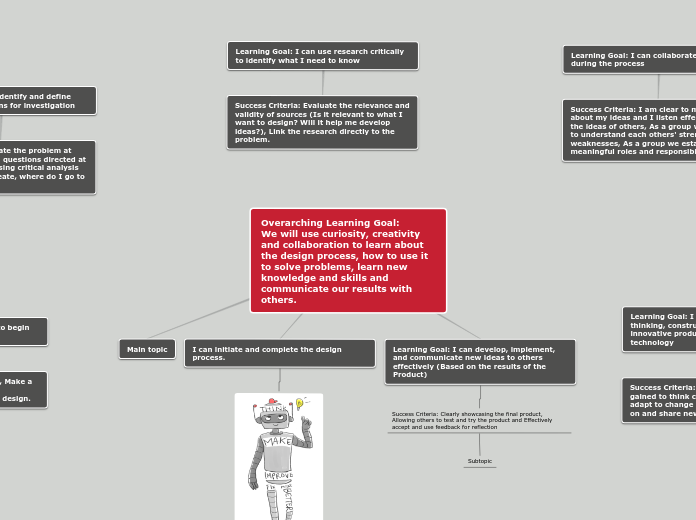reproducible research
as part of the
Open science movement
Practical tips
have a plan to organise, store, and make your files available
all files should be human readable
#comments in the machine readable codes
everything is a (text) file
.cvs or .txt
future-proof
document everything
session Info
R version 4.1.1 (2021-08-10)
Platform: x86_64-w64-mingw32/x64 (64-bit)
Running under: Windows 10 x64 (build 19043)
Matrix products: default
locale:
[1] LC_COLLATE=German_Austria.1252 LC_CTYPE=German_Austria.1252 LC_MONETARY=German_Austria.1252 LC_NUMERIC=C
[5] LC_TIME=German_Austria.1252
attached base packages:
[1] grid stats graphics grDevices utils datasets methods base
other attached packages:
[1] rmarkdown_2.11 gdata_2.18.0 captioner_2.2.3 gridExtra_2.3 rdrop2_0.8.2.1 data.table_1.14.2 ggridges_0.5.3 forcats_0.5.1
[9] stringr_1.4.0 dplyr_1.0.7 purrr_0.3.4 readr_2.0.2 tidyr_1.1.4 tibble_3.1.4 ggplot2_3.3.5 tidyverse_1.3.1
[17] EMCluster_0.2-13 Matrix_1.3-4 MASS_7.3-54 readxl_1.3.1 rio_0.5.27 googleVis_0.6.10 usethis_2.1.3
loaded via a namespace (and not attached):
[1] fs_1.5.0 lubridate_1.7.10 httr_1.4.2 rprojroot_2.0.2 tools_4.1.1 backports_1.2.1 utf8_1.2.2 R6_2.5.1
[9] DBI_1.1.1 colorspace_2.0-2 withr_2.4.2 tidyselect_1.1.1 prettyunits_1.1.1 processx_3.5.2 curl_4.3.2 compiler_4.1.1
[17] cli_3.0.1 rvest_1.0.1 xml2_1.3.2 desc_1.4.0 labeling_0.4.2 scales_1.1.1 callr_3.7.0 digest_0.6.28
[25] foreign_0.8-81 pkgconfig_2.0.3 htmltools_0.5.2 dbplyr_2.1.1 fastmap_1.1.0 rlang_0.4.11 rstudioapi_0.13 farver_2.1.0
[33] generics_0.1.0 jsonlite_1.7.2 gtools_3.9.2 zip_2.2.0 magrittr_2.0.1 Rcpp_1.0.7 munsell_0.5.0 fansi_0.5.0
[41] lifecycle_1.0.1 stringi_1.7.4 yaml_2.2.1 pkgbuild_1.2.0 plyr_1.8.6 crayon_1.4.1 lattice_0.20-44 haven_2.4.3
[49] hms_1.1.1 knitr_1.36 ps_1.6.0 pillar_1.6.3 codetools_0.2-18 pkgload_1.2.3 reprex_2.0.1 glue_1.4.2
[57] evaluate_0.14 remotes_2.4.1 modelr_0.1.8 vctrs_0.3.8 tzdb_0.1.2 testthat_3.1.0 cellranger_1.1.0 gtable_0.3.0
[65] assertthat_0.2.1 cachem_1.0.6 xfun_0.26 openxlsx_4.2.4 broom_0.7.9 memoise_2.0.0 ellipsis_0.3.2
>
Lab book
my example
GeoPT data interpretation
manuscript
submission to GGR
data source
software
programming language
Python
Jupyter Notebook
R
RStudio
knitr
storage
GitHub
Google Drive
Dropbox
reference manager
Zotero
open source
Citavi
subscription
collaborative writing platforms
Google Docs
Authera
Overleaf LaTeX
discovery
Google Scholar
ORCID
cornerstone of science
literature
Untertopic
books
AACH
Reproducible Research with R and RStudio
on GitHub
Zotero group
Open Science Training Handbook
What is reproducible research?
A Beginner's Guide to Conducting Reproducible Research
irreproducible research results
Nature - key reads
Nature - Reproducibility: A tragedy of errors
Nature - 1,500 scientists lift the lid on reproducibility
Schön scandal
Measles, Mumps, and Rubella (MMR) vacince and autism
measured here - reproduced everywhere
reproducible approach
raw data
data gathering
analysis
Research is considered to be reproducible when the exact results can be reproduced if given access to the original data, software, or code.
Research is considered to be reproducible when the exact results can be reproduced if given access to the original data, software, or code.
The "what" that needs to be reproduced is typically:
* Actual results themselves, which includes:
- Tables
- Visualizations/figures/graphs
- Values reported in the text
* The statistical evidence in support of the findings (e.g., p-values, confidence intervals, credible intervals).
* Data reduction procedures (normalisation values, corrections etc.)
Requirements for demonstrating the reproducibility
There is widespread agreement that research can only be reproducible when:
- The "raw" data is available, where "raw" refers to the data prior to any manipulation by the researcher (e.g., prior to any data cleaning and transformation).
- A complete set of instructions is provided explaining all steps used in the processing and analyzing the data.
The entire report is written using code
That is, a file or files are provided which, when run, import the data, produce all the results, insert the results into the text of the report, and format the report.
Open/transparent
all data and materials are available
e.g. GitHub
Details about the system being used to run the analysis
libraries
software packages
specific version
Providing a set of files containing the
code
data derived tables, charts, graphics
data
classical approach
presentation
poster
pdf
talk
ppt
publication
journal
interpretation
Excel
data collection
local PC









